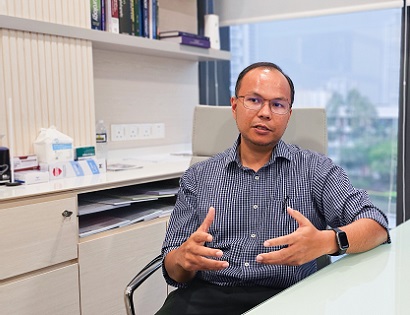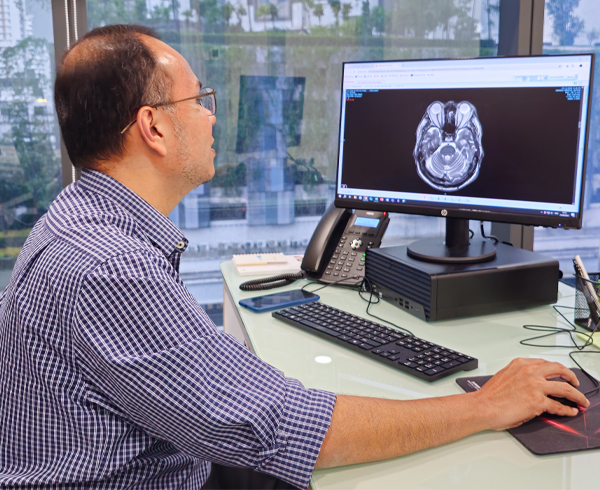Unlocking the Mysteries of the Brains: Interview with Dr Mohammad Imran bin Idris, Consultant Neurologist
04 October 2024

Neurology has long fascinated medical professionals as it deals with the brain, the most complex organ in the human body. Understanding how it controls movement, memory, and emotions, while diagnosing disorders like stroke and dementia, makes neurology both intellectually stimulating and challenging. Its intricacies demand not only clinical skill but also ongoing research to uncover effective treatments. This blend of practice and scientific inquiry is what drew Dr Mohammad Imran bin Idris, Consultant Neurologist at Sunway Medical Centre, Sunway City to the field.
With a PhD in vascular dementia from the University of Oxford, Dr Imran brings a wealth of experience and a focus on stroke and dementia. Now, he’s eager to bridge research and patient care to improve treatment options in Malaysia, offering new hope to those affected by neurological conditions.
Unravelling the Complexities of Dementia
Dr Imran’s interest in cognitive disorders began early in his medical training. He was fascinated by how memory functions in a healthy brain and equally intrigued by the processes involved in memory loss. “Memory is such a fundamental part of our identity. The more I studied it, the more I realised how much there was still left to understand, especially in diseases that impact cognition,” he explains. This passion naturally steered him toward studying dementia, a group of conditions that profoundly affect memory, thinking, and social abilities. Out of the various forms of dementia, Dr Imran was particularly drawn to vascular dementia, which results from problems in the supply of blood to the brain, often following a stroke.
There are many causes of dementia, with Alzheimer’s disease being the most common. But vascular dementia, which is often linked to strokes, seemed like an underexplored area with a lot of potential for impactful research,” he notes. When an opportunity arose to pursue a PhD in vascular dementia at Oxford, he seized it. “The timing was just right, and it felt like a perfect fit for my clinical and research interests,” he adds.
.jpg)
The Path to Clinical and Academic Excellence
But balancing a PhD with clinical responsibilities is no small feat. Dr Imran shares that it took him longer than the typical three to four years to complete his doctorate because he was simultaneously managing his profession as a neurologist. “It’s challenging to juggle both clinical practice and research, especially in a field as demanding as neurology.
Reflecting on his journey, Dr Imran acknowledges that the path to becoming a consultant neurologist is inherently long and arduous. “Medicine is already a lengthy course compared to other degrees, taking five to six years. After that, there’s a long period of clinical training, from junior doctor to medical officer to specialist and then consultant. Adding a PhD on top of all that clinical training stretched my timeline even further, but it was worth it. I’ve always been motivated by the idea of making meaningful contributions to both patient care and the scientific community.
The Complexity of the Brain
So, what drew Dr Imran to neurology in the first place? He admits that many people consider it one of the most complex and daunting fields in medicine. “There’s a perception that neurology is the hardest specialty in medical school. It’s true that it can be difficult, but that’s part of what makes it so intriguing. The brain is such a complex and powerful organ, and understanding how it works—and what happens when it doesn’t—is incredibly rewarding.
Dr Imran also points out a misconception about neurological disorders—that many of them are untreatable. “People often think that once you’re diagnosed with a neurological condition, there’s not much that can be done. This was true to an extent in the past, but things are changing rapidly. With advances in research and technology, we’re now seeing new treatment options that weren’t available before. It’s a really exciting time to be in this field.

Bridging Research and Clinical Practice
.jpg)
One of the areas Dr Imran is particularly enthusiastic about is the potential for new treatments in cognitive neurology. “Cognitive neurology, which deals with conditions affecting memory, attention, and language, is on the brink of some really promising breakthroughs,” he shares. He believes that ongoing research, including the use of artificial intelligence, will revolutionise how neurological diseases are understood and treated. “AI is being used to identify patterns in disease progression and predict which patients will respond best to certain treatments. These technologies could fundamentally change how we approach patient care.
In addition to his clinical work, Dr Imran is passionate about teaching. While he’s used to lecturing medical students, he also focuses on educating the public now. “Talking to the public is actually more challenging than lecturing students,” he admits. “With students, they’re expected to listen and learn. But when speaking to the public, you have to break down complex ideas into layman’s terms and make it engaging. You can’t rely on jargon, and you have to earn their interest.
He sees these public engagements as crucial, not just for raising awareness but also for building trust. “If people understand their condition better, they’re more likely to seek help early and stick to their treatment plans. It’s all about empowering them with the right information.
Making a Difference, One Patient at a Time
When asked about rewarding moments in his career, Dr Imran lights up. “There are many rewarding cases, from the simple to the complex. For example, someone with migraines who has tried everything but finally finds relief with the right medication—it’s a huge win. It’s not a rare or glamorous condition, but seeing the change in their quality of life is incredibly satisfying.”
For Dr Imran, it’s not always about finding a cure, but about making a meaningful impact on his patients’ lives. “Even when there’s no cure, there’s still so much we can do to help. Offering symptom relief, improving their quality of life—that’s what makes the job so rewarding.”
Now at Sunway Medical Centre, Dr Imran looks forward to bringing his expertise in stroke and dementia to a new group of patients and continuing his research into cognitive disorders. “There’s still so much to learn and so much potential to do good,” he says. And with his unwavering commitment to his field, there’s no doubt that he will.
Thank you, Dr Imran for your dedication and contributions to enhancing neurological care for patients in Malaysia.






